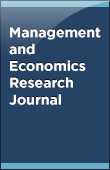


This study aims to assess the determinants of liquidity risk in the full-fledged Islamic banking system of Sudan, using panel data regression. The dependent variable in this research is the liquidity risk, which is determined as the extreme excess or extreme shortage of liquidity in each bank, based on the VaR approach, and the independent variables are bank size, investment, profit, and the budget deficit during the period 2012-2016. The authors’ findings indicate the bankspecific variables such as the size, investment, and profit are statistically significant, whereas the budget deficit variable is negatively associated with liquidity risk but is insignificant. The insignificance of the budget deficit variable is an indication of the government reliance on its deficit financing on debt financing, i.e., excessive money creation, as contrary to equity financing. Also indicated in the paper is that the investment variable has a positive and significant effect on liquidity risk, indicating that Islamic banks’ investment portfolios are dominated by short-term securities (sikook). This result supports the findings in the literature that investment portfolios in Islamic banks are likely to be dominated by short-term investment securities as a result of the absence of risk-hedging tools in the Islamic banking system, in general. The finding in the paper also indicates a positive and significant sign of profit coefficient with liquidity risk, which is similar to the positive association between higher risk and higher earnings relationships portrayed in the literature of corporate finance. The effect of the size indicator on liquidity risk reveals a positive and significant association, implying that larger banks are more likely to face liquidity risks of shortage as well as excess liquidity.